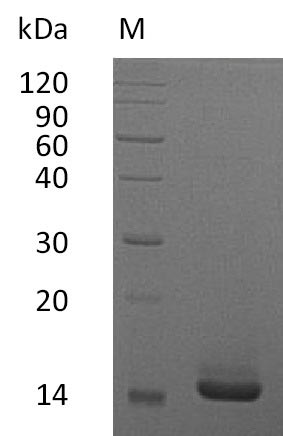Recombinant Human Granulocyte-macrophage colony-stimulating factor (CSF2) is expressed in E.coli and represents the full length of the mature protein, spanning amino acids 18 to 144. This tag-free protein appears highly pure, with a purity level exceeding 95% as confirmed by SDS-PAGE analysis. It demonstrates significant biological activity, with an ED50 of 4-20 pg/ml in a TF-1 cell proliferation assay. The endotoxin level is maintained below 1.0 EU/µg, as measured by the LAL method.
Granulocyte-macrophage colony-stimulating factor (GM-CSF), also called CSF2, is a crucial cytokine involved in hematopoiesis, primarily stimulating the production and differentiation of granulocytes and macrophages. It plays an integral role in immune response modulation and is likely a key factor in various cellular pathways, making it a valuable target for research in immunology and hematological studies.
Potential Applications
Note: The applications listed below are based on what we know about this protein's biological functions, published research, and experience from experts in the field. However, we haven't fully tested all of these applications ourselves yet. We'd recommend running some preliminary tests first to make sure they work for your specific research goals.
1. Cell Proliferation and Viability Assays
This recombinant human GM-CSF is highly potent (ED₅₀ 4-20 pg/ml in TF-1 cells) and suitable as a positive control in proliferation assays. However, researchers should validate optimal concentrations for different hematopoietic cell lines, as sensitivity may vary based on GM-CSF receptor expression levels. The high purity (>95%) and low endotoxin ensure minimal interference, but dose-response curves should be established for each specific cell type to account for potential differences in proliferation kinetics.
2. Hematopoietic Differentiation Studies
The biologically active GM-CSF is appropriate for differentiation studies, but differentiation may require different concentrations or exposure times compared to proliferation assays. Researchers should optimize conditions for specific precursor cells (e.g., bone marrow-derived progenitors) and include markers for granulocyte/macrophage lineage commitment. The high potency supports low-dose applications, but prolonged exposure may be needed for full differentiation.
3. Receptor Binding and Signaling Pathway Analysis
The tag-free GM-CSF is suitable for binding studies, but the E. coli expression may lack glycosylation, potentially affecting binding kinetics compared to native GM-CSF. Researchers should validate binding affinity (Kd) and signaling pathway activation (e.g., JAK-STAT, MAPK) against mammalian-expressed GM-CSF to ensure physiological relevance. The high purity supports accurate measurements, but kinetic parameters may need adjustment.
4. Antibody Development and Validation
This GM-CSF serves as a good antigen, but antibodies should be validated against native, glycosylated GM-CSF from human sources to ensure recognition of physiological forms. The high potency allows for functional neutralization assays, but cross-reactivity with other cytokines should be tested. The low endotoxin minimizes non-specific immune responses during immunization.
5. Cytokine Network and Immune Cell Interaction Studies
The protein is suitable for complex co-culture systems, but the high potency may lead to over-stimulation if not carefully titrated. Researchers should establish dose-response relationships in multi-cell systems and include controls for indirect effects via other cytokines. The low ED₅₀ allows precise dosing, but combinatorial effects with other immune modulators may alter outcomes.
Final Recommendation & Action Plan
This recombinant human GM-CSF is an exceptionally high-potency reagent suitable for all proposed applications, but researchers must account for its extreme activity (ED₅₀ 4-20 pg/ml) through careful dose optimization. For immediate use, start with picogram-level concentrations and perform detailed dose-response curves for each specific cell type and assay format. When studying signaling or binding, validate key findings with mammalian-expressed GM-CSF to address potential glycosylation differences. For antibody development, use this protein for immunization but confirm specificity against native GM-CSF from biological samples. In complex co-culture systems, include gradient dosing and controls to distinguish direct GM-CSF effects from secondary cytokine responses. The high purity and low endotoxin make it ideal for sensitive assays, but always include vehicle controls and baseline measurements to ensure accuracy.






